Posts Tagged ‘port 22’
Friday, December 30th, 2011 Earlier I've blogged about how to prevent brute force attacks with fail2ban, denohosts and blockhosts , however there is easier way to secure against basic brute force attacks by not installing or configuring any external programs.
The way I'm talking about uses simple iptables rules to filter out brute force attacks.
Here is a small script to stop ssh and FTP invaders which try to initiate more than 3 consequential connections in 5 minutes time to port 22 or port 23:
SERVER_MAIN_IP='AAA.BBB.CCC.DDD';/sbin/iptables -N SSH_WHITELIST
/sbin/iptables -A INPUT -p tcp --dport 22 --syn -m recent --name sshbr --set
/sbin/iptables -A INPUT -p tcp --dport 22 --syn -j SSH_WHITELIST
/sbin/iptables -A INPUT -p tcp --dport 22 --syn -m recent --name sshbr \
--update --rttl --hitcount 3 --seconds 300 -j REJECT --reject-with tcp-reset
/sbin/iptables -A SSH_WHITELIST -s $SERVER_MAIN_IP -p tcp --dport 22 --syn -m recent --rttl --remove
The only thinIf the rules are matched iptables filter rules will be added to the iptables CHAIN SSH_WHITELIST
In case if you want to add some more truested IPs add some more iptables rules, like:
ALLOW_IP='BBB.CCC.DDD.EEE';
/sbin/iptables -A SSH_WHITELIST -s $ALLOW_IP -p tcp --dport 22 --syn -m recent --rttl --remove
Each filtered IP that matches the rules will be filtered for 5 minutes, if 5 minutes is enough, the 300 value has to be increased.
Tags: ALLOW, BBB, blogged, brute force, CCC, ddd, dport, EEE, filter rules, INPUT, ips, iptables, Linux, Main, name, nbsp, port, port 22, port 23, removeEach, sbin, server, ssh, sshbr, SYN, time, value, way, whitelist
Posted in Computer Security, Linux, System Administration | 2 Comments »
Monday, December 12th, 2011 One of the Debian servers’s SSH daemon suddenly become inaccessible today. While trying to ssh I experienced the following error:
$ ssh root@my-server.net -v
OpenSSH_5.8p1 Debian-2, OpenSSL 0.9.8o 01 Jun 2010
debug1: Reading configuration data /etc/ssh/ssh_config
debug1: Applying options for *
debug1: Connecting to mx.soccerfame.com [83.170.104.169] port 22.
debug1: Connection established.
debug1: identity file /home/hipo/.ssh/id_rsa type -1
debug1: identity file /home/hipo/.ssh/id_rsa-cert type -1
debug1: identity file /home/hipo/.ssh/id_dsa type -1
debug1: identity file /home/hipo/.ssh/id_dsa-cert type -1
...
Connection closed by remote host
Interestingly only the SSH server and sometimes the mail server was failing to respond and therefore any mean to access the server was lost. Anyways some of the services on the server for example Nginx continued working just fine.
Some time ago while still working for design.bg – web development company, I’ve experienced some similar errors with SSH servers, so I already had a clue, on a way to work around the issue and to secure myself against the situation to loose access to remote server because the secure shell daemon has broken up.
My work around is actually very simple, I run a secondary sshd (different sshd instance) listening on a different port number.
To do so I invoke the sshd daemon on port 2207 like so:
debian:~# /usr/sbin/sshd -p 2207
debian:~#
Besides that to ensure my sshd -p 2207 will be running on next boot I add:
/usr/sbin/sshd -p 2207
to /etc/rc.local (before the script end line exit 0 ). I do set the sshd -p 2207 to run via /etc/rc.local on purpose instead of directly adding a Port 2207 line in /etc/ssh/sshd_config. The reason, why I’m not using /etc/ssh/sshd_config is that I’m not sure if using the sshd config to set a secondary port does run the port under a different sshd parent. If using the config doesn’t run the separate ssh port under a different server parent this will mean that once the main parent hangs, the secondary port will become inaccessible as well.
Tags: bg, clue, com, company, config, configuration data, doesn, exit, file, hipo, host, instance, mail server, mx, nginx, number, openssl, parent, port 22, reason, remote server, root, RSA, script, secure shell, server, Shell, shell daemon, soccerfame, ssh port, ssh server, ssh servers, sshd daemon, time, type, usr, web development company, work
Posted in FreeBSD, Linux, System Administration | No Comments »
Tuesday, August 2nd, 2011 
Today I’ve learned from a admin colleague, a handy tip.
I’m administrating some Linux servers which are configured on purpose not to run on the default ssh port number (22) and therefore each time I connect to a host I have to invoke the ssh command with -p PORT_NUMBER option.
This is not such a problem, however when one has to administrate a dozen of servers each of which is configured to listen for ssh connections on various port numbers, every now and then I had to check in my notes which was the correct ssh port number I’m supposed to connect to.
To get around this silly annoyance the ssh client has a feature, whether a number of ssh server hosts can be preconfigured from the ~/.ssh/config in order to later automatically recognize the port number to which the corresponding host will be connecting (whenever) using the ssh user@somehost without any -p argument specified.
In order to make the “auto detection” of the ssh port number, the ~/.ssh/config file should look something similar to:
hipo@noah:~$ cat ~/.ssh/config
Host home.*.www.pc-freak.net
User root
Port 2020
Host www.remotesystemadministration.com
User root
Port 1212
Host sub.www.pc-freak.net
User root
Port 2222
Host www.example-server-host.com
User root
Port 1234
The *.www.pc-freak.net specifies that all ssh-able subdomains belonging to my domain www.pc-freak.net should be by default sshed to port 2020
Now I can simply use:
hipo@noah:~$ ssh root@myhosts.com
And I can connect without bothering to remember port numbers or dig into an old notes.
Hope this ssh tip is helpful.
Tags: administrate, annoyance, auto detection, cat, client, com, configHost, domain pc, example server, file, freak, handy tip, home, linux servers, net, noah, number 22, number option, order, port, port 22, port numbers, purpose, remotesystemadministration, root, root port, server host, server hosts, somehost, ssh, ssh client, ssh command, ssh connections, ssh port number, sub, subdomains, time, tip, www
Posted in Linux, System Administration | No Comments »





